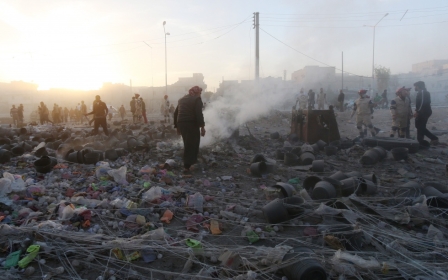Sharing the skies with Assad: America’s predicament in Syria

Last week I spoke to Manaf, a resident of the Syrian city of Raqqa currently controlled by the Islamic State. He made his frustration clear: “the politics don’t matter to the people here, all we see is one type of death - it comes from the sky, whether the Americans are dropping the bombs or Assad, it makes no difference. They are both murdering us.”
He added: “What do you expect any sane person to think here? One day American airplanes and the next Bashar’s, how do they not crash or shoot each other? It is simple, they call each other and say today is my turn to kill the people of Raqqa, please don’t bother me, it will be yours tomorrow”.
There is a view prevalent among Syrians today that the US-led coalition’s aerial campaign is backfiring; rather than “degrading” the Islamic State (IS) as Barack Obama promised, the bombardment is turning Syrians against America and increasing sympathy for the militants and their radical cause.
This view is reinforced by IS propaganda. Paying careful attention to its image, the group has framed the coalition’s war as a modern-day version of Europe’s crusades against Muslims in the Middle Ages. The militant brand of Wahhabism IS espouses, puts a further sectarian spin on the conflict: a war is being waged on “true Muslims”, or Sunnis, by “infidel” Shiites of Iran, Iraq and Syria with the help of corrupt Gulf client states.
Recent events in the central city of Raqqa also indicate that the West’s latest war in the Middle East is failing. Located on the northern bank of the Euphrates River, with a population of half a million, Raqqa was seized by local rebel and militant groups in March 2013. The city was subsequently overrun by IS who, after a ruthless assault on rival militants and a pogrom against religious minorities, especially Christians, declared Raqqa the capital of their nascent Caliphate.
US fighter jets have targeted IS positions inside the city since September and, though the coalition has sought to avoid civilian casualties, several civilians have been killed in residential neighbourhoods where militants are embedded. This has fuelled resentment. Today the people of Raqqa, beaten down by three years of war and bloodshed, add America to a long list of enemies. Losing the hearts and minds of locals under IS rule should be a grave concern for the coalition who have no coherent strategy or viable partner on the ground in Syria.
In Iraq, the US is collaborating with the Iraqi army, Sunni tribal militias, Kurdish Peshmerga and Shia militias backed by Iran, in their fight against the Islamic State. Teaming up with local players has proved effective; IS-controlled territory has been reclaimed, the group’s advance on Baghdad has stalled. Some are predicting that a killer blow could be delivered as early as next spring.
In Syria, however, the “killer blow” against IS - if it ever comes - will not be for several more years, according to estimates by top US officials. The US, despite wading into the Syria conflict, appears to have given up on its former rebel allies, the Free Syrian Army (FSA) who have themselves been sidelined by the powerful Jabhet al-Nusra, al-Qaeda Syria branch.
This has left America in a tight-spot; since it is unwilling or unable (due to public perception and internal politics) to work openly with the one strong military force fighting Nusra and Islamic State - the Syrian regime. America’s alternative – training and equipping a new, carefully vetted, rebel army – will take at least a year. Until then, the US seems to be biding its time, using airstrikes to try and weaken IS and keep it on the run.
To complicate matters further, America is also targeting Jabhet al-Nusra and other militant groups such as Ahrar al-Sham, groups deemed as terrorists organisations by the US, yet valued by other ‘more moderate’ rebel factions in the country who consider them vital in the fight against Assad. (Groups like IS and al-Nusra have been the most effective force on the ground, winning crucial battles and driving government forces out of key territories throughout the conflict).
So the US is stuck; each militant it kills strengthens Assad and lessens the power of the rebels fighting him. America, once had a simple end game in Syria: apply heavy military pressure and the regime will be forced to make concessions, including the removal of Assad. Today, that seems more like wishful thinking than a realistic outcome. Any effective military pressure can only come from the very extremist militant groups the US wants to destroy.
A conflict “freeze” seems to be what the U.S is seeking now, in an effort to halt ongoing advances by the regime into rebel-held territory around Aleppo. The regime is unlikely to agree to a ceasefire unless it can gain assurances of its own survival, in other words a reversal of the US’s “regime change” policy. This does not necessarily mean the continuation of Assad’s presidency, but the structural integrity of the regime he heads, the perseverance of its interests and networks of power. Such a deal, while difficult to negotiate, is not entirely out of the question.
Striking a deal with Assad is a deeply unsavory prospect for many but it is, at least for now, the only real alternative. If it is not seized upon soon this “deal with the devil” may eventually become a de facto reality, a necessary pact, whether struck openly or covertly, as the US’s options on Syria continue to shrink.
Some in Raqqa already believe a covert alliance between the US-led coalition and the Syrian regime - who have taken turns bombing their city – is in place. Denials by the US will not convince them otherwise. This week government war planes bombed the city, killing and injuring over 200 people, many of them civilians. Anger and outrage are running high and they are now being directed at America too.
- Edward Dark is MEE's Aleppo-based columnist and writes under a pseudonym
The views expressed in this article belong to the author and do not necessarily reflect the editorial policy of Middle East Eye.
Photo Credit: A child looks at stand selling military fatigue in the northern rebel-held Syrian city of Raqqa on October 1, 2013
Stay informed with MEE's newsletters
Sign up to get the latest alerts, insights and analysis, starting with Turkey Unpacked
Middle East Eye delivers independent and unrivalled coverage and analysis of the Middle East, North Africa and beyond. To learn more about republishing this content and the associated fees, please fill out this form. More about MEE can be found here.





